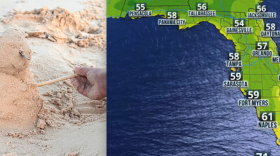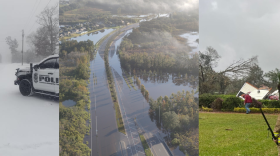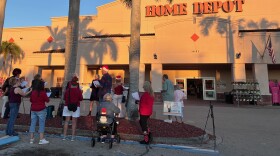JERUSALEM — Israeli police shot and killed a man who they alleged tried to snatch an officer's gun at an entrance to a Jerusalem holy site early Saturday, raising fears of further violence during a time of heightened tensions at the flashpoint compound.
Later Saturday, the Israeli military said a Palestinian driver rammed his vehicle into a group of Israelis in the occupied West Bank. Israeli medics said three people were wounded, two seriously, and the alleged attacker was shot dead.
In Jerusalem's police shooting, Palestinian worshippers at the entrance to the site on Saturday morning had a different account, saying that police shot the man at least 10 times after he tried to prevent them from harassing a woman who was on her way to the holy compound, home to Al-Aqsa Mosque in the heart of Jerusalem's Old City — the third holiest shrine in Islam. The compound, revered by Jews as the Temple Mount, is also the most sacred site in Judaism.
The police said the slain man was 26-year-old Mohammed Alasibi from Hura, a Bedouin Arab village in southern Israel. The village council called for a thorough investigation of his killing and a general strike Saturday in protest.
Hours after the incident, the muddy stone alleyway leading to Al-Aqsa Mosque was still stained with blood. Alasibi's family said he was a physician who had recently passed his exams and earned his M.D. in Romania. He returned to his hometown a month ago, his cousin said, and was caring for his sick father as he worked to get certified in Israel.
"He is a polite, kind man from a family of doctors who was going to Al-Aqsa for spiritual reasons," his cousin Fahad Alasibi said. "If you want us to believe that he tried to attack police, then show us the security footage."
A police spokesperson pushed back on Palestinian accounts, insisting there was no woman walking to the compound at midnight because the complex was closed to visitors under an agreement with an Islamic trust called the Waqf controlled by Jordan.
Nonetheless, a few dozen people have been trying to sleep at the mosque overnight during the Islamic holy month of Ramadan, prompting Israeli police to intervene and try to evict the worshippers.
The police spokesperson said Alasibi first aroused suspicion walking toward the shuttered compound. After being stopped for questioning, the spokesperson said Alasibi jumped on one of the officers and grabbed his gun, managing to fire two bullets toward policemen as the officer struggled to restrain him. Police described the incident as an attempted terrorist attack and said they shot and killed him in self-defense. No officers were injured. The spokesperson said there was no camera on the inner wall of the compound that could have captured the incident.
Palestinian worshippers at the compound Saturday disagreed. Noureddine, a 17-year-old who lived in the neighborhood and declined to give his last name for fear of reprisals, said he saw Alasibi confront police who had stopped a female worshipper on her way to Al-Aqsa Mosque. Alasibi's relationship to the woman was not clear. He said some kind of disagreement broke out between Alasibi and the officers before he heard a dozen shots ring out.
"Nothing could justify that many shots," he said, pointing to chaotic footage he filmed that showed Palestinian vendors and worshippers screaming at the sound of bullets being fired in rapid succession. "They were fired at close range."
His cousin Fahad said Alasibi was worried about making the trip from Israel's Negev desert to Al-Aqsa because his ailing father relied on him. "But he went because praying there during Ramadan means a lot to him," he said.
The city's contested compound has been a focus for clashes in the past, particularly in times of turmoil in Israel and the West Bank. This year, as violence surges in the occupied territory under the most right-wing government in Israeli history, fears of an escalation in Jerusalem have mounted with the start of the Islamic holy month of Ramadan. Israeli police have boosted their forces as tens of thousands of Muslim worshippers flock to Al-Aqsa Mosque for prayers.
On Friday, more than 200,000 Palestinians gathered at the compound for noon prayers, which passed peacefully.
Noureddine said police forced Palestinian vendors and worshippers out of the area after the incident, beating him and others with batons. Israeli police briefly closed the site before reopening it for dawn prayers.
Confrontations at the hilltop compound have triggered wider violence in the region in the past. Clashes at the site in May 2021 helped fuel the outbreak of a bloody 11-day war between Israel and Gaza Strip's Hamas rulers.
This year's convergence of Ramadan with the Jewish holiday of Passover could increase the possibility of friction as the Old City hosts a massive influx of pilgrims.
For the past year, Israeli-Palestinian fighting has surged in the occupied West Bank. At least 86 Palestinians have been killed by Israeli or settler gunfire this year, according to an Associated Press tally. Palestinian attacks against Israelis have killed 15 people in the same period. Israel says most of those killed have been militants. But stone-throwing youths protesting police incursions and people not involved in the confrontations have also been killed.
Copyright 2023 NPR. To see more, visit https://www.npr.org.








